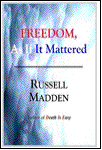 |
 |
|
|
 |
 |
|
|
1. What legislation to you plan to introduce that will address a specific issue/concern in the 1st District?
2. What should be done to preserve Social Security?
3. What legislation would you propose to address the high cost of prescription drugs?
4. How should we determine (and who should determine) when to send U.S. troops to foreign countries?
5. What legislation would you propose to address concerns about the quality of elementary and secondary education?
6. What legislation would you propose to aid public universities?
7. How do your positions differ from those of your opponents?
The unspoken assumption with these and other questions I have been asked is that the purpose of government -- and especially the federal government -- is to take care of people and to solve their problems for them. I think such an assumption is incorrect.
Legally, the federal government, in particular, has only those "enumerated powers" granted it by the Constitution. It is supposed to do only that which it is permitted to do. Instead, I would be hard pressed today to find any area of life -- whether on the local, state, or national level -- that Congress and the other branches of government do not think they have the right to legislate.
Some in Congress point to the "general welfare" clause as a supposed justification for the intrusion of the State into any and all areas of life. But as James Madison pointed out in The Federalist Papers (#41), if such a broad interpretation of federal powers were accepted -- that the government can and should be able to legislate on nearly any subject -- then there would have been no point in listing what the federal government is allowed to do. The view of the "general welfare" clause now in vogue in this country would, for Madison, have formed the essence of an omnipotent state; one that had "unlimited power."
While many people -- and especially politicians -- pay only lip service to the Constitution and its rules and principles for governing American society, I, for one, intend to honor its ideas and its ideals; not only because they are the ultimate law in this country but because they are right and the best means for preserving (or restoring) freedom to the citizens of the United States.
As Thomas Jefferson said, "A wise and frugal government, which shall restrain men from injuring one another, which shall leave them otherwise free to regulate their own pursuits of industry and improvement, and shall not take from the mouth of labor the bread it has earned. This is the sum of good government."
Somewhere in the last hundred years, we have lost sight of that vision.
There are two fundamental ways to regulate social interaction. One is by persuasion: if you desire something from someone or want people to act in a certain way, you must respect their moral autonomy and liberty and convince them to give you what you want or to do what you desire.
The second option is to force them to give you their property or to do what you demand. (Force is the essence of laws: if you could persuade someone to act in accordance with your plans, there would be no need to force them. As George Washington said, government is not eloquence; it is force.)
I reject this second option. My opponents do not.
When speaking of adults, people have the right to think, do, and say whatever they want as long as they act peacefully and do not initiate force against other people (i.e., do not threaten others or do not physically harm them) or damage the property of others.
People have the right to be wrong. The purpose of government is not to enforce morality. It is to ensure we have the conditions necessary to practice and make our own moral choices (even if we choose wrongly or foolishly) without fear of forcible reprisal against us. The purpose of government is to protect our rights (as envisioned by Jefferson). It most assuredly is not to violate our rights by forcing us to surrender our property or to act against our own moral and practical judgments.
For the citizens of this country, it is their responsibility; it is their decisions; it is their money; it is their lives. Their lives belong to them; not to me or you or any politician. (If you believe otherwise, what part of your life and your money belongs to me? I'd be happy to accept your weekly check for the portion that is mine.)
The classic example demonstrating the great chasm in the ethical thought processes of today's citizens between their private and their public lives starts with a neighbor.
If you desired a new television, say, and you knew your neighbor had one, would it be proper for you to barge into his living room, seize it, claim you wanted or needed it, and then take it home with you? Do you think you'd make it to the front door?
No, of course not.
What if you knew your neighbor might resist, would it then be fine for you to enlist the aid of another neighbor? Just march into the other man's house and grab his television while your new ally held the owner at bay?
I hope not.
Would you be in the right if you got every able-bodied man on the block to join your cause? Would a dozen or a score of hulking bodies backing you up vindicate your "liberation" of the coveted TV?
Hardly.
How about if you stayed home and merely hired a bunch of burly boys to break into your neighbor's domicile to grab what you wanted? After all, you never set foot on the owner's property. You merely received what was taken from him by other people.
There might be some who could evade their role in this scenario and accept the television guilt-free. Most of us, though, could understand the illicit character of such a subterfuge.
What if you and a majority of your neighbors together hired a team of agents to "appropriate" the television, sell it, and split the proceeds? Transparent thievery?
Well, yes.
So how does this despicable behavior somehow become transmuted to the gold of good intentions and justice when that majority calls itself the "voters," the enforcers are elected, paid, and labeled "politicians" or -- worse -- public "servants," and the poor neighbor who is merely attempting to enjoy the use of his own property -- that disputed TV -- is designated a "taxpayer" whose wealth can safely and self-righteously be confiscated and distributed to undeserving others without his consent? Adding insult to injury, if the victim complains about the theft of the goods he earned with a portion of his own life, his own effort, he is chastised, insulted, demeaned, and condemned by his neighbors for not paying his "fair share."
I am the only candidate in this election who will work tirelessly and doggedly to repeal laws that restrict the rightful freedom of my fellow citizens. There is something seriously wrong with a system which takes over half the income of the average citizen in taxes, regulations, and fees (more than is spent on housing, food, and clothing). There is something seriously wrong with a system where a person has to ask permission to exercise a Constitutionally guaranteed (not granted) right such as the right to self-defense. There is something seriously wrong with a system where people's lives, property, and decisions are usurped by politicians who know nothing about them.
If elected, I will do everything within my power to enforce the Constitution. I will respect the Bill of Rights...all the rights (whether guaranteed explicitly or implicitly).
I will uphold the property rights of everyone -- rich, poor, or middle-class.
I will champion personal choice...in all areas of life.
I will work to end the War on People erroneously dubbed the War on Drugs.
I will prevent the government from destroying the retirement income of our citizens via the so-called Social "Security" system and robbing them of the wealth they have earned.
I will stop the state from regulating ideas and remove it from an educational process that deteriorates the more money we throw at it and the more government interferes in the rightful decisions of parents.
I will repeal all anti-self-defense laws which keep those most in need of protection unarmed and at the mercy of criminals.
I will end all subsidies for both businesses and individuals which enrich one group of people at the expense of another.
I will keep the state from worsening our health care system and stop it from continually increasing the cost of medicine while simultaneously restricting the freedom of citizens to control their own bodies and lives.
I will prevent the state from censoring the Internet or any other means of communication.
I will eliminate "consensual crimes" which punish peaceful behavior and treat adults as though they were children.
I will defend and promote freedom in any and all circumstances.
For too long, the politicians have bribed people with their own money, all the while acting as though they are doing us a favor as they increase their own power at the expense of our wealth and our freedom.
It is far past time for someone to demand that this nonsense stop.
I ask that people vote for me, yes. But even more, I ask that they vote for freedom: freedom for themselves.